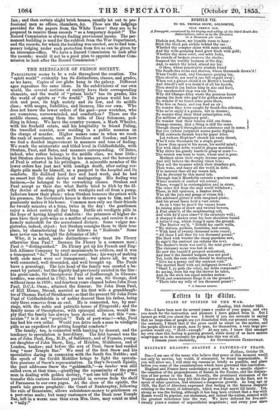THE BIENSE&NCE OF PRISON SOCIETY.
PABALLFTISM seems to be a rule throughout the creation: The "spirit world" evidently has its distinctions, classes, and grades, as we have. Copies of our globe hang in the galaxy. Different ages reproduce the same ideas. In the subdivisions of our own world, the several sections of society have their corresponding elements, and the world of "prison birds" has its grades, like the world of spirits; or " the world." The prison world has its rich and poor, its high society and its low, and its middle class; with usages, liabilities, and licences, like our own. Who does not know the lower orders of the gaol—poor wretches, who are numerous, narrowminded, and comfortless ? There are the middle classes, among them the tribe of 'key Solomons, ped- dling in felony. We have the country yeoman, a Mark Wheeler, with his freehold estate, and his hospitality to friend Paling, the travelled convict, now residing in a public mansion on the charge of murder. Higher names come in when we reach the rank of merchants, such as Davidson and Gordon; and here we find a decided improvement in manners and tone of feeling. We reach the aristocratic and titled level in Coldbathfields, with Strahan, Paul, and Bates, and manners corresponding. Of Bates, indeed, who rather belongs to the middle class, we hear little ; but Strahan shows his breeding in his manners, and the baronetcy of Paul is attested in his privileges. A miserable member of the lower orders has just met with condign death, after eating ver- digris pills made by himself, as a passport to the hospital and its comforts. He disliked hard fare and hard work, and he had no resort but the stale device of malingering. His feeling was laziness,—he belonged to the unworking classes. Strahan and Paul accept as their due what Battle tried to filch by the fil- thy device of making pills with verdigris and oil from a pump. Inferiors know their place : when Strahan honours the prison with his presence, the Governor's house is thrown open to him, and he graciously makes it his home. Common men only see their friends for twenty minutes at a time, twice in the day : the gentlemen enjoy a select society all day long. Battle ate verdigris pills in the hope of having hospital comforts : the prisoners of higher de- gree have their port-wine as a matter of course, and receive it as a homely makeshift for the accustomed dietary. Some vulgar ma- gistrates, indeed, object ; but Strahan consigns them to their true place, by characterizing the low fellows as " Radicals." Some men never can be taught the delicacies of life! Why, it is asked, make distinctions—why treat De Fleury otherwise than Paul ? Because De Fleury is a common man ; Paul is " distinguished." De Fleury got up his French and Eng- lish Alliance Company to erect monuments to soldiers, and it was a transparent "do." Paul held real securities; • his ways of making both ends meet were not transparent ; but above all, he was well connected, well descended, and well brought up. The Paula have a genealogy. The late head of the family was created a ba- ronet by patent; but the dignity had previously existed in the line : his great-uncle, Sir Onesiphorus Paul. of Rodborough in Glouces- tershire, was created in 1762; but his only son, Sir George, died without issue in 1820 ; and fourteen years elapsed before John Dean Paul, D.C.L. Oxon., attained the honour. Sir John Dean Paul, of Hill House, Stroud, married as his first wife a granddaugh- ter of Thomas Earl of Strathmore; so that the present Sir John Dean Paul of Coldbathfields is of nobler descent than his father, being only three removes from an earl. He is connected, too, by mar- riage, with the noble and patriotic house of Fitzgerald; and the family name of Onesiphorus, with episcopal alliances, would im- ply that the family has always been devout. Is not this "con- nexion " ? is it not " position"? Talk of port-wine !—why, Paul has had his own cellar. Would you drive such a man to verdigris pills as an expedient for getting hospital comforts? The family, too, is connected with banking by descent, and the tendency to speculation is hereditary. The first baronet was the son of John Paul, Esq., M.D., of Salisbury, and of Francis, young- est daughter of John Snow, Esq., of Hendon, Middlesex, and of London, banker; and before the sera of Paul, Snow had resided long "near Temple Bar." We read of the first Snow and his spceulative daring in connexion with the South Sea Babble; and the epoch of the Credit Mobilier brings to light the specula- tive passions of Snow's representative. In Gay's Seventh Epistle, the poet addresses Snow the "goldsmith,"—as banker was still ealled even at that time,—glorifying the equanimity of the great man in dealing with golden destiny, "not one bill unpaid." We transfer this curious historical parallel in reverse from the shelf of Parnassus to our own pages. At the close of the epistle, the poet's tale grows prophetic : the Court of Bankruptcy, following the rule of bienseance, allows subsistence-money to gentlemen on a port-wine scale ; but many customers of the Bank near Temple Bar, left in a worse case than even Mrs. Gore, may count as mad * "


































 Previous page
Previous page